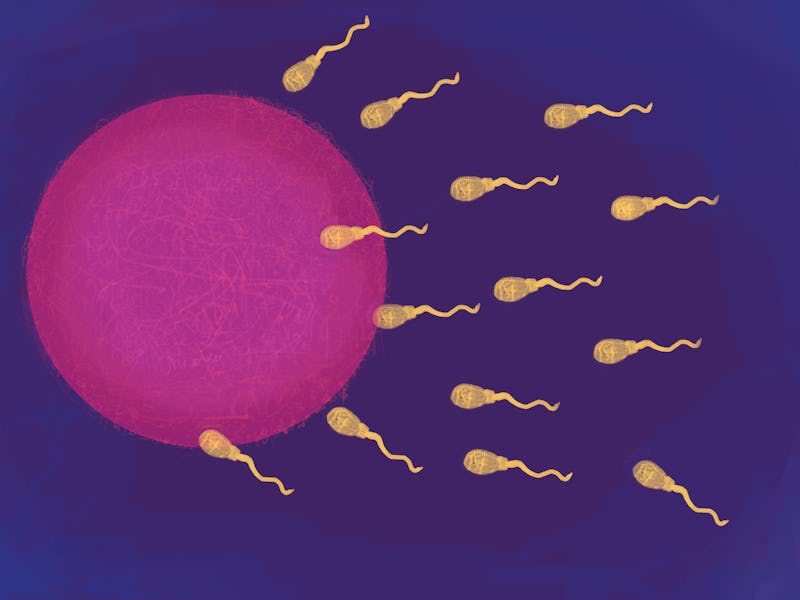Sperm Study Increases Concern That Climate Change Will Kill Off Species
“The survival of natural populations ultimately depends on individuals being able to reproduce.”

The past five years have collectively been the warmest years in the modern record. Some the effects of climate change are obvious — think shrinking Arctic sea ice and bleached coral — but other repercussions manifest in less visible ways. According to a new study in the Journal of Evolutionary Biology, some of the worst effects of climate change will affect something very small: sperm.
"The survival of natural populations ultimately depends on individuals being able to reproduce."
Scientists have already raised fears that climate change will make it harder for species across the animal kingdom to conceive. In the new paper, this concern extends to the Indian meal moth (Plodia interpunctella), an insect commonly found in North America. The University of Lincoln scientists found that the higher the temperature that a moth spends its developmental years in, the harder it is for it to create healthy sperm later in life.
Even worse is the pattern they witnessed in terms of the moths’ sex lives, which had never been seen in mammal studies: Higher temperatures also reduced the likelihood that the males would even attempt to copulate.
“Our study is consistent with current evidence that the production of sperm and mating behavior are sensitive to developmental temperature, and, in an era of global warming, further research in this area — examining both male and female fertility — is vital,” co-author and University of Lincoln evolutionary ecologist Graziella Iossa, Ph.D., said Monday.
“The survival of natural populations ultimately depends on individuals being able to reproduce,” she continued.
The Indian meal moth's sperm becomes worst the higher the temperature the moth is raised in.
Warm Temperatures Now Have Major Effects Later
In the study, culture dishes full of male moth larvae were exposed to temperatures ranging from 68 to 86 degrees Fahrenheit. Once they grew into adults, they were introduced to females reared at 77 degrees Fahrenheit and given the opportunity to mate.
The effects of temperature during development lasted throughout the moths’ lifetime. With every incremental increase in developmental temperature, the two types of sperm the moths later produced got shorter — which means the sperm was less effective for reproduction. Furthermore, the amount of time they spent having sex and achieving completion was also affected by the temperature at which they developed. Males spent “significantly less time in copula as developmental temperatures increased.”
Iossa says this study indicates species could become infertile and “therefore could become extinct” at much lower temperatures than scientists have previously theorized. And with temperatures on the rise, the futures of entire species are at stake.
The hotter the temperature, the worst it is for sperm.
Global Warming Affects Cold-Blooded Animals Too
It’s well understood that male mammals have testes outside of their body cavity because sperm is damaged by excessive heat inside the body. However, recent research shows that sperm is damaged by heat outside of the body as well. In 2018, scientists from the University of California, Los Angeles determined that higher temperatures have a significant negative effect on human fertility and birth rates.
Disturbing as it sounds, that finding was in line with what we already know about the sperm of warm-blooded animals: high temperatures damage sperm quality. The new study switches the focus to the sperm of cold-blooded species to get a greater sense of how climate change will affect the animal kingdom.
The impact of climate change on cold-blooded creatures — especially insects — is an area of increasingly intense research. In 2018, a Nature Communications study revealed that experimental heatwaves compromised the sperm function of beetles as well, perhaps explaining recent biodiversity declines. And in February, a report in Biological Conservation showed that more than 40 percent of insect species are declining and a third are endangered as a result of intensive agriculture, urbanization, and climate change. Mammals like polar bears and the now-extinct Bramble Cay melomys may be the outward faces of climate change, but this study is a reminder that without the world’s bugs, the survival of ecosystems is gravely threatened too.
Abstract:
In both plants and animals, male gametogenesis is particularly sensitive to heat stress, to the extent that a single hot or cold day can compromise crop productivity or population persistence. In animals, heat stress during development can impact a male’s ability to secure copulations and/or his post-copulatory fertility. Despite such observations, relatively few studies have examined the consequences of developmental temperature on the reproductive behavior and physiology of individuals. Here, we report for the first time the effects of developmental temperature on the phenotypic expression of both apyrene and eupyrene sperm and the copulatory behaviour of the Indian meal moth, Plodia interpunctella. We show that the length of both apyrene and eupyrene sperm decreases with increasing developmental temperature and that males are less likely to engage in copulation when reared at the highest and lowest temperatures. Where copulation occurred, the duration of copula decreased as male developmental temperature increased. We argue that identification of the mechanisms and consequences of reproductive failure in animals facing heat stress will help understand how wild and domesticated populations will respond to global climate change. We also contend that such studies will help elucidate long-standing evolutionary questions around the maintenance of genetic variation in traits highly relevant to fitness and the role of phenotypic plasticity in driving the evolution of novel traits.